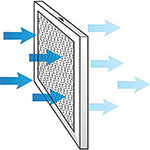On All Orders Within The Contiguous U.S.
On All Orders Within The Contiguous U.S.
 The air filter in your home HVAC unit is a critical component of the whole system. Made from mostly cardboard and fiber, they may not seem elaborate, but air filters greatly affect your unit's performance. Not only do they play a big role in indoor comfort, but they also have a major impact on HVAC equipment. Here is what you need to know about air filters, how they work, and why they are so important in maintaining your home's heating and cooling systems. Hopefully, it will also aid you in selecting the right filter to best fit your needs!
The air filter in your home HVAC unit is a critical component of the whole system. Made from mostly cardboard and fiber, they may not seem elaborate, but air filters greatly affect your unit's performance. Not only do they play a big role in indoor comfort, but they also have a major impact on HVAC equipment. Here is what you need to know about air filters, how they work, and why they are so important in maintaining your home's heating and cooling systems. Hopefully, it will also aid you in selecting the right filter to best fit your needs!
Air filters are typically manufactured with one of these two materials: spun fiberglass material or pleated paper/cloth. The material is enclosed in a cardboard frame, then made into different sizes to fit all the various HVAC systems available. The filter's primary function is to trap and hold all different kinds of particulates and contaminants in the air that circulate through your heating and cooling system. Most of which affect your health and comfort. A few of these contaminants include:
The air filtration occurs when the disbursed air is "sucked" back into the HVAC system where it is conditioned and then used again. During this process, air is forced through the air filter. The spun fiberglass or pleated paper/cloth traps the particulates and contaminants, removing them from the air. These particles are now no longer able to be recirculated into the air you breathe.
As with almost all products we purchase, there are lower-end, mid-level and high-end choices available. Not all products are created equal. Not all air filters will clean your air with the same efficiency. The higher the quality, the more contaminants that will be removed from your indoor air. Keep in mind that these higher quality air filters are usually cost a bit more.
This is where the filter's MERV rating comes into the picture. MERV stands for "Minimum Efficiency Reporting Value". It is a numeric value for rating and comparing the filter's efficiency and performance. The range for standard MERV values is typically from 1 to 16; the number indicating how well the filter will remove material from the air. The higher the MERV rating, the better the filtration.
MERV 1-4: Common standard filters. Basic filtration. Low cost.
MERV 6-8: Good filtration and typically used in residential settings. Made of cloth or pleated paper.
MERV 9-12: Middle of the road filters with relatively high efficiency. Can trap particles of 1 micron or larger.
MERV 13-16: Highest efficiency, best standard filters available. Can trap particles as small as 0.3 microns or larger.
There are filters available with MERV ratings higher than 16; however, they are thick and dense, and a typical residential HVAC system cannot readily handle them. In fact, they can interfere with the airflow by restricting it. This reduces the effectiveness of your heating and cooling systems and can even result in damage to the HVAC equipment. Make sure that your HVAC system can handle filters with MERV ratings higher than 16 before buying and installing one.
There are also additional units that can be installed along with your HVAC system that are designed for air filtration and purification. These air cleaners provide an additional step "on top" of the regular filtration, cleaning your air even further.
All the air that circulates through your HVAC system, to heat or cool your home, will eventually pass through the air filter. Therefore, it is extremely important to keep your air filters clean and change them regularly. Dirty, clogged air filters can:
Air filters should be checked at least once a month. If they are dirty, change them out with a fresh clean air filter. To check if your air filter is dirty, remove it from the air filter and hold it up to a light source. If you can't see the light through the filter, then it's time for it to be changed.
No matter which type of HVAC system your home has, every unit needs a quality air filter that fits properly in order to maximize your indoor air quality and keep your unit running efficiently. US Home Filter can provide you with the best and most efficient HVAC filter available! Changing the filter in your furnace is as important as changing the oil in your car and US Home Filter offers filters to fit all heating and air conditioning units. From standard to custom air filters, to whole-house filters, grille filters and humidifier filters, we have all of your filter needs covered!
Selecting the filters that are just right for your home can be difficult and confusing at times. At US Home Filter we understand this, which is why we offer an experienced staff to help answer any questions you may have. For personal assistance with your air filter needs, please contact us now online or call us at (855) 237-1673 and we will do our very best to assist you in selecting the right filter for your individual needs. We want to earn your business and we guarantee your satisfaction! Take advantage of our quality products, vast selection, low prices, and enjoy FREE SHIPPING on every air filter order within the Contiguous USA.